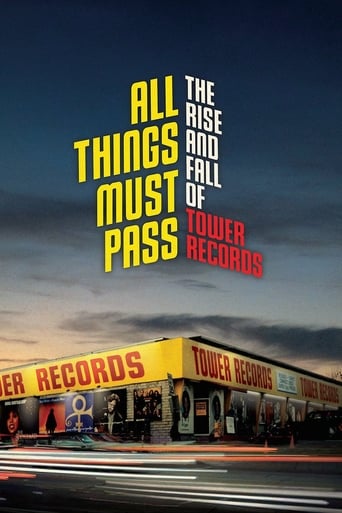

Just perfect...
... View MoreIn other words,this film is a surreal ride.
... View MoreI wanted to like it more than I actually did... But much of the humor totally escaped me and I walked out only mildly impressed.
... View MoreNot sure how, but this is easily one of the best movies all summer. Multiple levels of funny, never takes itself seriously, super colorful, and creative.
... View MoreI recall being excited to visit the Tower Records store in LA in the mid 1990s on my first visit to the west coast of the USA. When I returned a decade later to their San Francisco store, it somehow felt less exciting, the store looked a little too ordinary and it seems they were having a fire sale on. A few months later Tower Records had gone bust.Colin Hanks documentary examines the growth of this record chain from its early years from founder's Russ Solomon's dad's drug store where he had a section which sold records.Russ took over the business in the 1960s, starting in the west coast and moving to the east coast and then internationally to Japan.As is the case, these heady years of the counterculture was a supposedly drug and drink fuelled hazy party for the staff (it always seem to be the case with maverick start ups.) Live hard and party hard was the motto. The staff I saw in the 1990s seemed to be mainly bored teenagers on minimum wage.At the turn of the millennium Tower Records was valued at $1 billion. Their seemed to be no end to its success and they were determined to sell albums, preferably CDs. The impact of online shopping was a body blow. The Apple Store allowed you to buy singles you wanted for 99 cents. Tower Records wanted you to buy the whole album for an ever increasing price and their online servers was on AOL.Even worse the young IT savvy consumer could now get music for free from Napster and other torrent sites. Combined with the company's debt laden expansion, choppy waters awaited them.The documentary interviews key staff from the early days as well as the man himself Russ Soloman who comes across as a charismatic maverick. We also get to hear from musicians such as Dave Grohl, Elton John and Bruce Springsteen about their joy in visiting the Tower Record stores, browsing, talking to aficionados. Elton admits he spent a fortune in their shops.The documentary was a bit messy, in fact a little overlong. We see a former executive being fired by a new management team and how Russ took him out for a meal after a Christmas party which bought him to tears. I wanted to know why he was fired, why he could not get another job, what happened after he went for a meal with Russ and then the same executive turns up later on when the attention shifts to the company's declining fortunes.In fact seeing some of the staff being interviewed I was impressed how they managed to become so big, it seemed to be more by serendipity than design.
... View MoreGrowing up in Los Angeles, Tower Records was the one stop megastore to hit for the latest LP's, imports, posters etc. It definitely has its place in the lexicon of California culture, and the Sunset Boulevard store had a nice selection of indie punk rock 45s during the late 70s where you could stop in after a show at the Whisky a-go-go and find the latest vinyl.I don't know how much truth there truly is in the story offered here, although the cover notes state that it was not the internet that brought about this company's demise. Sorry, I find that very hard to believe.While other reviewers have noted greed and price fixing was responsible, ultimately it was the internet, and digital technology and the obsoleting of the cassette and, in one word, progress. The founder Mr. Solomon remained mistakenly sold on the fact the buyers would always want to have a library collection of music in their homes in the form of vinyl LP's boxed sets, CDs and the like, but this would not apply to later generation of buyers with their new gadgets i.e. iphones, ipads, e-pods, a-frames, tampads, etc etc ad nauseum.And then add Napster, Kazaa and all the other "wares" to the mix, the writing was on the wall. They were nice store personnel and more often knew their stuff, styles, genres, and history, but it just couldn't last without a product to sell. Much in the same way that X-rated theaters went the way of all flesh with the boom of the videocassette and the DVD, technology eventually trumped it all.Nevertheless, they remain a wonderful memory in the annuls of history and made a difference in the lives of so many music fans during the earlier days of rock and roll and they should be proud.
... View MoreThis a feature documentary film taking a good glimpse at the rise and fall of a legacy. Tower Records dominated the retail music market for decades coming to rise in 1960. The birth child of the flamboyant and rebellious founder Russ Solomon. Humble beginnings becoming a powerhouse in the industry. By 2000, Tower records was worth $1 billion and six years later fell victim to the Internet and free streaming music sites, proving a major lesson of objectivity to how business is at the fate of realities in the ever changing marketplace. In 2006, as Tower Records faded in the sunset of bankruptcy, two hundred stores in thirty countries, the heart and soul of the music world stopped beating. But the legacy remains.Some of the music featured: Bob Wills & the Texas Playboys, Perry Como, The Rooftop Singers, the Beach Boys, T. Rex, Steve Miller Band, Rolling Stones and George Harrison.Sharing commentary are: David Geffen, Steve Knopper, David Grohl, Chris Cornell, Elton John, Chuck D., Bruce Springteen, Heidi Cotler, Steve Nikkel, Mike Ferrace and Russ Solomon.
... View MoreGreetings again from the darkness. I do not envy those experiencing their childhood in this modern era. Sure, they have far superior electronics and hundreds more TV channels, but they also have very little independence (most can't even walk alone to a friend's house or a park) and they likely will never experience the pure joy of perusing the stacks at Tower Records (or any other record store) for hours experiencing the thrill of discovering a new artist or style of music that rips into their soul. OK, I admittedly suffer from a touch of "old man" syndrome, but filmmaker Colin Hanks (yes, the actor and son of Tom) has delivered both a cozy trip down memory lane and a stark accounting of good times and bad at Tower Records.With humble beginnings as little more than a lark, Tower Records began when Russ Solomon's dad decided to sell used 45 rpm singles in his cramped Sacramento drug store. He bought the singles for 3 cents and sold them for 10 cents. Within a few years, Russ purchased the record business from his dad, and proceeded to run it as only a rebellious kid from the 1960's could. From 1960 through 2000, the business grew each year. It expanded the number of stores (peaking at 192 worldwide) and constantly adjusted to the musical tastes and the delivery method – 45's, LP's, cassettes, CD's, etc.Using some terrific photographs and video clips, accompanied by spot on music selections, director Hanks brilliantly and generously allows the actual players to tell the story. The expected celebrity drops are present, and even the words of David Geffen, Dave Grohl, Bruce Springsteen and Sir Elton John carry emotion. However, far and away the most impact comes from extended interviews with the unconventional and charismatic Tower Records founder Russ Solomon and his devoted and forthright employee team. Their sincere recollections provide the roadmap through the phenomenal growth, as well as the devastating end in 2006. We understand how these stores became so much more than retail outlets they were cultural hotspots for at least two generations. We also learn some things we probably shouldn't like the definition of "hand truck fuel", and the reason Russ installed hot lighting in the listening booths.Mr. Hanks surprises with his ability to balance nostalgia and the harsh realities of the downfall of an iconic cultural business. The film captures the key role Tower Records, while also pointing out that the crash was due to more than just Napster and digital music delivery. An interesting case study for business majors highlights the importance of vision vs debt. For more insight from Colin Hanks, check out the interview from film critic Chase Whale: http://www.hammertonail.com/"No Music. No Life". The motto of Tower Records was somehow inspirational, and fit perfectly for stores that featured mammoth album artwork on their store fronts, their own "Pulse" magazine, and staff that couldn't fathom life without music much less wearing a suit and tie to work. This was truly "a chain of independent stores", and trust me when I tell you that hanging out at Tower Records was more fun than having hundreds of cable channels.
... View More